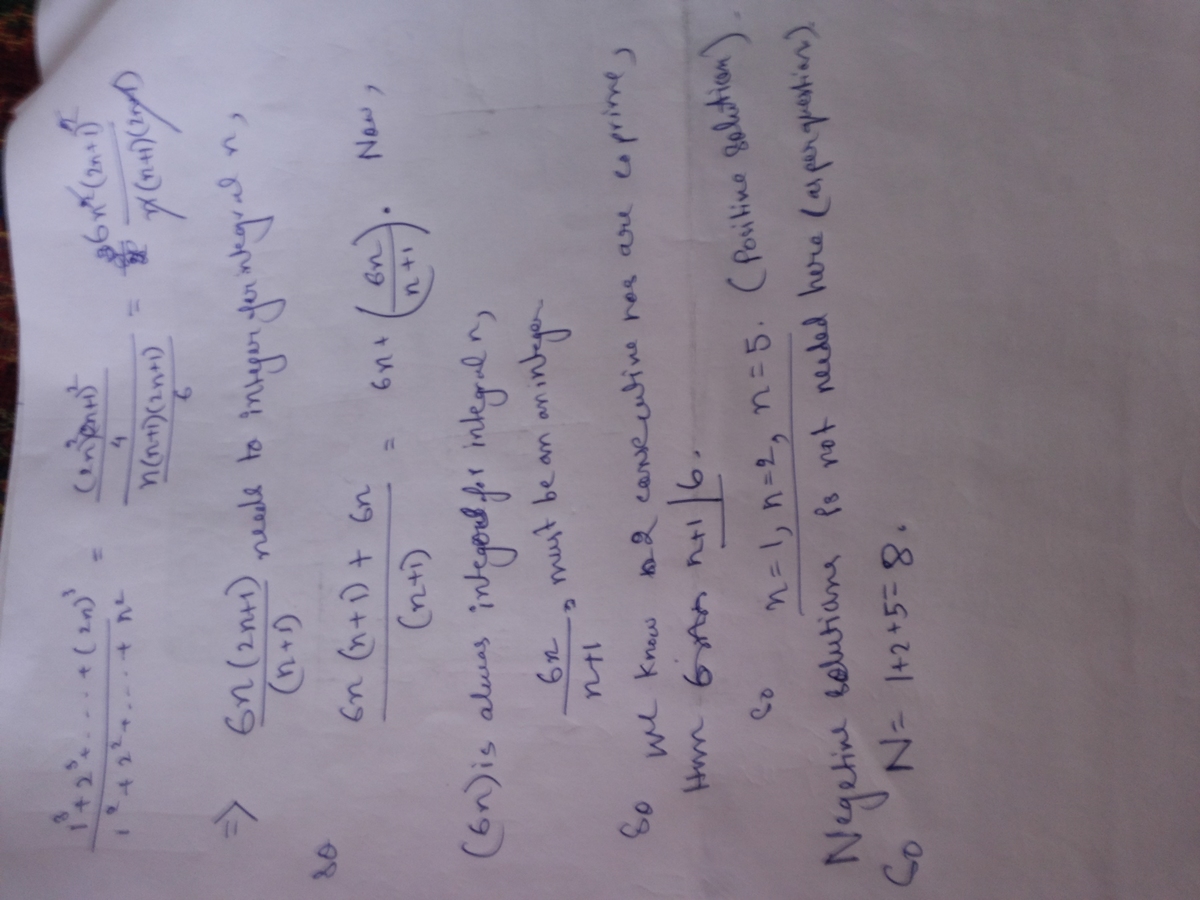KVPY #1
Find the sum of all positive integers n for which 1 2 + 2 2 + ⋯ + n 2 1 3 + 2 3 + ⋯ + ( 2 n ) 3 is also an integer.
For more KVPY questions, try my set .
The answer is 8.
This section requires Javascript.
You are seeing this because something didn't load right. We suggest you, (a) try
refreshing the page, (b) enabling javascript if it is disabled on your browser and,
finally, (c)
loading the
non-javascript version of this page
. We're sorry about the hassle.
4 solutions

It should be
n + 1 6 n ( 2 n + 1 ) = n + 1 6 n ( n + 1 ) + 6 n 2 = 6 n + n + 1 6 n 2
N = 1 2 + 2 2 + 3 2 + ⋯ + n 2 1 3 + 2 3 + 3 3 + ⋯ + ( 2 n ) 3 = 6 n ( n + 1 ) ( 2 n + 1 ) ( 2 2 n ( 2 n + 1 ) ) 2 = n ( n + 1 ) ( 2 n + 1 ) 6 n 2 ( 2 n + 1 ) 2 = n + 1 6 n ( 2 n + 1 ) = n + 1 6 n ( 2 n + 2 ) − 6 n = n + 1 1 2 n ( n + 1 ) − 6 ( n + 1 ) + 6 = 1 2 n − 6 + n + 1 6
For N to be an integer, n + 1 6 has to be an integer and there are only three cases of positive integer n = 1 , 2 , 5 . And, their sum is 1 + 2 + 5 = 8 .
I don't think 1 3 + 2 3 + 3 3 + . . . . . + ( 2 n ) 3 can be written as ( 2 2 n ( 2 n + 1 ) ) 2 since 2 n is not the general term of the series. Unless and until we don't have the n t h term, we can't use that formula.
Log in to reply
Let m = 2 n , then 1 3 + 2 3 + 3 3 + ⋯ + m 3 = ( 2 m ( m + 1 ) ) 2 . Replace m with 2 n .
Did the same way.
After solving the complex above we get
12n^2+6n/n+1
6n(n+1)+6n^2/n+1
(6n)+(6n^2)/n+1
(6n(n+1)-6n)/n+1
6n/n+1
(6(n+1)-6)/6
6/n+1
n=1,2,5
N=1+2+5=8
1 2 + 2 2 + ⋯ + n 2 1 3 + 2 3 + ⋯ + ( 2 n ) 3 = ∑ k = 1 n k 2 ∑ k = 1 2 n k 3 = 6 n ( n + 1 ) ( 2 n + 1 ) 4 ( 2 n ) 2 ( 2 n + 1 ) 2 = n + 1 6 n ( 2 n + 1 )
Now for n + 1 6 n ( 2 n + 1 ) ∈ Z + , three situations are possible
( I ) n + 1 ∣ 6 ⟹ n ∈ { 1 , 2 , 5 }
( I I ) n + 1 ∣ n ⟹ n ∈ ∅
( I I I ) n + 1 ∣ 2 n + 1 ⟹ n + 1 ∣ n + ( n + 1 ) ⟹ n + 1 ∣ n ⟹ n ∈ ∅
Thus the sum of all values of n is 1 + 2 + 5 = 8 .